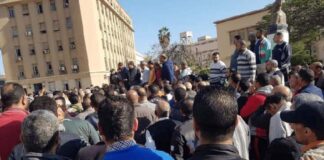Not content with overthrowing the figurehead of a repressive regime, the Egyptian working class is targeting Mubarak-era officials still running the military and public institutions. Workers at the Shebin spinning and weaving factory have been on strike for over a month and are heading to court to turf out the factory owners completely.
Their strike has gained rapid support from workers across the country fighting the same battle for higher wages and more control over industry.
Protesters in the city of Qena blocked the Lower-Upper rail line on April 21, demanding the sacking of a governor associated with the old regime. Twelve students from Cairo University face disciplinary measures after leading protests to oust the university’s deputy dean, who has ties to the former ruling National Democratic Party.
The military, once favoured by protests, has come under scrutiny. As soon as the military took control they banned strikes. They have since gone further, introducing a ban on public protest and curfews in Upper Egypt.
“My opinion is that the military council is a supporter of the old regime,” said Sayyid Hozayen, who attended the massive “Friday of Warning” demonstration in Cairo on April 8. “They were a part of it, so they are defending it in every way they can.”
Hozayen was just one of an estimated million protestors in and around Tahrir Square on April 8, following a similar demonstration (the “Friday to Save the Revolution”) a week before. Protesters demanded a new constitution to replace the military-drafted constitution ratified on March 20, the firing and prosecution of all members and supporters of the Mubarak family and the scraping of the new laws outlawing protest.
On April 8, a number of military officers declared their support for the revolution and called for the dissolution of the Supreme Council of the Armed Forces, to be replaced by a civilian council with a solitary military representative. “I came to reassure people that I’m one of them… We all want one thing—a life with social justice,” said Mahmud Ahmad el-Hifni, a first lieutenant at the demonstration. The dissent is spreading into the army itself is a display of the strength of the mass movement that was born in the February revolution.
The army responded with brutality on April 9, firing live ammunition at the crowds. Seven people were killed and 40 others arrested.
Thousands of activists and trade unionists have been locked up by the military since Mubarak’s fall. Some have been tortured. Activist Michael Nabil described the situation on his blog: “The army and the people are not one hand … The revolution has so far managed to get rid of the dictator, but the dictatorship still exists.” Nabil has since been jailed for three years for “insulting the armed forces”.
Constitution
The military has tried to justify their rule on the basis of the new constitution. It limits presidential terms to a maximum of two four-year spells and professes to guarantee political freedom. Only 41 per cent of eligible voters turned out for the referendum and 77.2 per cent of those voted “yes”—a very low turnout in the context of the mass political involvement across the country. A “no” campaign was led by the Egyptian left, who criticised the lack of time for parties to organise to contest elections and the lack of change inside the regime. The left’s fears were confirmed on March 28 when the Supreme Council of the Armed Forces passed a law requiring political parties to gather 5000 signatures from 29 governorates in order to apply for registration that would take at least 30 days to be approved—a deliberate attempt to make it harder for revolutionaries and the left to contest the elections.
The military has made a show of its criminal interrogation of Mubarak himself, his family and members of the National Democratic Party. They’ve ordered the removal of Mubarak’s image from public institutions. But despite the tough talk, Mubarak remains in hospital at a Red Sea resort—largely due to goodwill from within the new military regime. The members of the Supreme Council of the Armed Forces worked alongside Mubarak for years.
The fight to “cleanse” Egypt of the old regime echoes the “saneamiento” (cleansing) process that developed in Portugal after the Armed Forces movement overthrew the right wing dictatorship in April 1974.
Much like in Portugal, it holds the potential to deepen the revolution from a political revolution that toppled a dictator into a social revolution that has the potential to topple a whole political system.
A deepening of the resistance inside the working class and the army is needed in the months to come.
By Ernest Price




